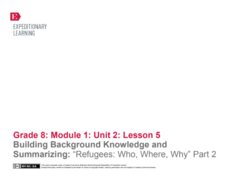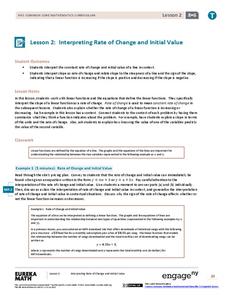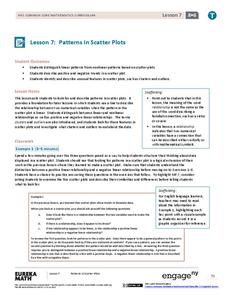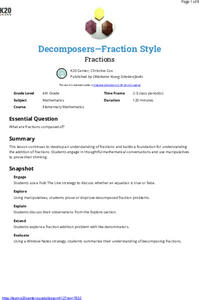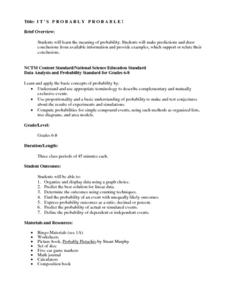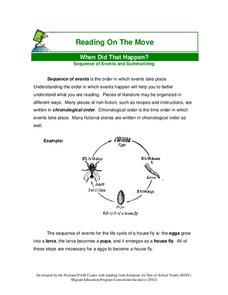Curated OER
Summarizing with Somebody Wanted But So
Teach your young readers how to summarize a text using a strategy called Somebody Wanted But So. Kids identify the character (Somebody), the motivation (Wanted), the conflict (But), and the resolution (So). The resource comes with...
Syracuse City School District
Summary of Fiction and Non-Fiction Text
Somebody Wanted But So Then (SWBST)? Yes! Here's a great strategy for teaching young readers how to summarize narrative text. In addition, the packet includes exercises that show kids how to summarize nonfiction text using the classic...
EngageNY
Building Background Knowledge and Summarizing: “Refugees: Who, Where, Why” Part 2
What are some universal aspects of refugees' experiences worldwide and throughout history? Scholars read the text "Refugees: Who, Where, Why" and create two class anchor charts. Finally, they each write a paragraph that provides an...
EngageNY
Summarizing Informational Text: “Hawaii’s Endangered Happy Face Spider”
Put on a happy face. Using an interesting resource, pupils read an informational text about Hawaii's endangered Happy Face Spider. Next, they participate in a jigsaw discussion to find the gist of the article.
Education Center
Safety Sequence
Follow up a class reading of the children's book Officer Buckle and Gloria with this simple sequence-of-events worksheet. Including pictures of six key moments from the story, young learners must first number them in the correct...
Scholastic
Tell Us a Tale: Teaching Students to Be Storytellers
Encourage scholars to retell their favorite short story or folktale, adding personal details to make it their own. After reading their book of choice several times, story tellers retell a tale verbally to their classmates.
EngageNY
Introducing New Athletes to Research: Althea Gibson and Roberto Clemente
Let's take a walk! Scholars participate in a gallery walk to view images and text about athletes Althea Gibson and Roberto Clemente. After summarizing the information they've learned, pupils choose which athlete they are interested in...
Reed Novel Studies
Beezus and Ramona Novel Study
What are some of the advantages and disadvantages of having siblings? Pupils explore this topic with the Beezus and Ramona novel study. Additionally, scholars answer questions about chapter one of the time-honored book by Beverly Cleary...
EngageNY
Interpreting Rate of Change and Initial Value
Building on knowledge from the previous activity, the second activity in this unit teaches scholars to identify and interpret rate of change and initial value of a linear function in context. They investigate how slope expresses the...
EngageNY
Patterns in Scatter Plots
Class members investigate relationships between two variables in the seventh installment of a 16-part module that teaches scholars how to find and describe patterns in scatter plots. Young mathematicians consider linear/nonlinear...
EngageNY
Grade 10 ELA Module 2: Unit 1, Lesson 18
Examine how Martin Luther King Jr.'s final paragraphs of "Letter from Birmingham Jail" summarize the ideas throughout the piece. Readers discuss word usage and new vocabulary and complete guided questions to better understand how the...
EngageNY
Grade 10 ELA Module 3: Unit 1, Lesson 1
Can people live forever? Scholars ponder the answer as they analyze an excerpt from The Immortal Life of Henrietta Lacks. As readers discover Lacks' immortal cells, they discuss how the author carefully sequences, connects and unfolds...
K20 LEARN
Decomposers—Fraction Style: Fractions
"What are fractions composed of?" is the essential question of a lesson designed to enhance understanding and strengthen the foundation of adding fractions. Mathematicians start by discussing what makes an equation true or false,...
DePaul University
Working at the Television Station
There's a lot that goes on behind the scenes of a local news program. Read this passage independently or as a whole class to learn about all the different people that work hard to bring us the news. Afterward, young learners determine...
EngageNY
End of Unit Assessment, Part II: Storyboard Draft, Sections 2 and 3
It's time to demonstrate knowledge. With the instructive resource, pupils complete the second part of the end of unit assessment. They develop sections two and three of their storyboards about an invention, add visual elements, and then...
EngageNY
End of Unit Assessment, Part III: Storyboard Draft, Section 4
Reflection is the best teacher. Using the resource, scholars complete the final part of their end of unit assessment, the fourth section of their storyboard about an invention. Next, they track their progress using a self-reflection...
EngageNY
Listening Closely and Taking Notes: Colonial Trade Podcast About the Wheelwright
Voices from the past. Young scholars listen to a podcast interview with a historical re-enactor as they continue their research in the eleventh instructional activity of this unit on colonial trade. Applying their close reading skills,...
National Security Agency
It's Probably Probable
Learners make predictions and draw conclusions from given information as they learn the meaning of probability in this vocabulary-rich, integrated activity that presents a variety of teaching strategies to motivate and reach...
Texas Center for Learning Disabilities
Second and Third Grade Explicit Phonics Intervention
Support all young learners on their journey to literacy with this five-lesson reading intervention unit. Following a clearly outlined format, each lesson first engages children in practicing their phonemic awareness and phonics...
EngageNY
Mid-Unit Assessment: Analyzing an Author’s Argument and Text Structure
William Shakespeare: a writer, a poet, a fake? For their mid-unit assessments, scholars read an excerpt from the article "The Top Ten Reasons Shakespeare Did Not Write Shakespeare" by Keir Cutler. Next, they analyze the author's argument...
EngageNY
Analyzing How Shakespeare’s Play Draws upon Greek Mythology: Part 2
Pupils explore the narrative structure of a piece of literary text, mapping out the plot structure of the Greek myth "Pyramus and Thisbe." Next, they use their completed graphic organizers to write story summaries.
EngageNY
Mid-Unit 2 Assessment: Analyzing Narrative Structure and Author’s Craft: Part 1
Using the resource, scholars complete a mid-unit assessment to gauge their learning at the halfway point of the unit. Pupils read the myth "The Harvest That Never Came" and plot its narrative structure.
E Reading Worksheets
Main Idea 2
Learners read short paragraphs, summarize the passage in one sentence, and then develop an appropriate title that indicates the main idea of the selection. Part of a series of exercises designed to build literary skills.
Curated OER
When Did That Happen?
An awesome packet teaches individuals how to chronologically order and sequence events. The resource also provides practice that immediately follows the different ways to order events. Lastly, learners read a newspaper article...


